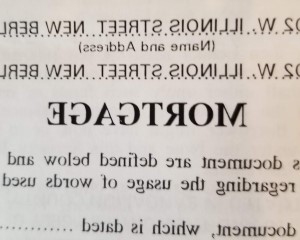
If it’s right for you, a reverse mortgage can be a worthwhile financial tool. If not, you could cause some serious problems for your financial future.
A reverse mortgage gets its name because of the way it works. Instead of the borrower making payments to the lender, the lender releases equity to the borrower in a number of forms:
- A lump sum cash payment;
- A monthly cash payment, like a pension or annuity;
- A line of credit which you can draw on in varying amounts as you need the funds (this option tends to be the most popular due to its flexibility);
- Some combination of the above.
When the owner dies or moves away (perhaps to a long-term care facility), the home can be sold and the loan paid off. Any leftover equity value can go to the living owner or the designated heirs. Heirs don’t have to sell the house: they can either pay off the reverse mortgage with their own funds or refinance the outstanding loan balance within six months.
There are three basic types of reverse mortgages:
- Single-purpose reverse mortgages, which are offered by some state and local government agencies as well as some nonprofit organizations;
- Home Equity Conversion Mortgages (HECMs) are federally insured reversed mortgages backed by the U. S. Department of Housing and Urban Development (HUD);
- Proprietary reverse mortgages are private loans that cover home values usually over $600,000.
The size of a reverse mortgage is determined by the borrower’s age, the interest rate and the home’s value. The older a borrower, the higher percentage that can be borrowed. The amount of the mortgage is limited to the lesser of the home’s appraised value, sale price, and the federal HECM limit of $625,500.
Reverse mortgages have traditionally been chosen by older Americans who are having a tough time paying for everyday living expenses. Matters such as long-term care premiums, home health care services, home improvements or paying off their current mortgage or credit cards may be greater than their income can support. More recently, though, they’ve become popular with individuals who see them as a better alternative to home equity lines. Some use the proceeds to supplement monthly income, buy a car, fund travel and even to purchase a second home. Review reverse mortgage options with the help of a financial adviser to determine if there are any unique, “outside the box” options for you.
Before applying for a HECM, you must meet with a counselor from an independent government-approved housing counseling agency. Some lenders offering proprietary reverse mortgages also require counseling.
The counselor is required to explain the loan’s costs and financial implications. The counselor also must explain the possible alternatives to a HECM – like government and non-profit programs, or a single-purpose or proprietary reverse mortgage. The counselor also should be able to help you compare the costs of different types of reverse mortgages and tell you how different payment options, fees, and other costs affect the total cost of the loan over time. You can visit HUD for a list of counselors, or call the agency at 1-800-569-4287. Counseling agencies usually charge a fee for their services. This fee can be paid from the loan proceeds, and you cannot be turned away if you can’t afford the fee.
Other things to consider
Cost: Reverse mortgages are generally more expensive than traditional mortgages in terms of origination fees, closing costs and other charges. The basic FHA-backed HECM loan finances these fees into the initial loan balance, and they can often run between $12,000 and $18,000. The loans are based on anticipated home value appreciation of four percent a year, so if the housing market is healthy, those costs are generally recovered in a short period of time. But if the housing market sours, it will definitely take longer to recoup those fees.
There is also the cost of mortgage insurance to consider. You will have an up-front charge for federal mortgage insurance, which will amount to between 0.5% and 2.5%, depending upon the type of disbursement you’ll be receiving. There is also an annual premium for mortgage insurance which will be 1.25% of the outstanding mortgage balance.
Interest rates and costs: As you draw funds from the equity in your home, interest is added to your balance every month. This can result in quite a surprise over time, as the interest costs add up. Reverse mortgages have rates that are typically higher than those charged on conventional mortgages. This interest is not tax deductible while you are drawing funds from the equity.
Your mortgage can be called: The homeowner or estate always retains title to the home, but if you fail to pay your property taxes, adequately maintain your home, pay your insurance premiums, or change your primary residence, the lender can declare the mortgage due or reduce the amount of monthly cash advances to pay those overdue amounts.
Talk to your kids. If your house is your major asset, getting involved in a reverse mortgage may not leave much to the next generation – if it appreciates, there may be some difference that the kids can have. That’s why that in addition to discussing a reverse mortgage with a financial adviser, persons considering a reverse mortgage need to talk with their family.